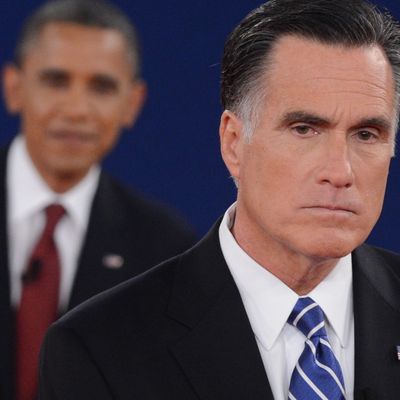
President Obama is not a great debater, but in the second presidential debate, he gave his best performance. Mitt Romney came off well, but not nearly as well as he had during the first debate. Obama enjoyed friendly questions from an audience that obviously leaned left. But more important, Obama simply did not allow Romney to occupy the center as he had before.
This time around, Obama did not chew up time defending his record or delve into policy minutia. He used every question to pivot to a sharp attack on Romney. The combination of the ideologically hostile questions and Obama’s relentless attacks put Romney on the defensive, and kept him there.
Obama came into this debate having formulated a simple frame for his opponent: Romney believes that people like himself can play by different rules. Into this frame he shoved Romney’s business career, personal income tax rate, and his public policy. And on the very last question, he attacked Romney for his infamous 47 percent comments — not as fiercely as he could have, but well enough.
At times, Romney appeared complicit in Obama’s strategy. Tonally, he seemed nastier and more like the plutocrat Obama painted him as. He was given one golden opportunity with a teed-up question asking how he would differentiate himself from George W. Bush — possibly his most essential threshold question. He dribbled it off the tee, promising he would do more to promote domestic oil drilling, and then launching into a digression about China, before ending on this rambling monologue:
Our party has been focused too long. I came through small business. I understand how hard it is to start a small business. That’s why everything I’ll do is designed to help small businesses grow and add jobs. I want to keep their taxes down on small business. I want regulators to see their job as encouraging small enterprise, not crushing it.
And the thing I find the most troubling about Obamacare, well it’s a long list, but one of the things I find most troubling is that when you go out and talk to small businesses and ask them what they think about it, they tell you it keeps them from hiring more people.
My priority is jobs. I know how to make that happen. And President Bush has a very different path for a very different time. My path is designed in getting small businesses to grow and hire people.
So Romney differs from Bush because … he wants to cut down on taxes and regulation, and opposes Obamacare? In response, Obama declared that Romney differed from Bush not on economics but in his more conservative social stances. It was not the most powerful attack, but it was one Romney seemed to confirm for him.
I have a proven record of badly misjudging what answers and tone the American people will find appealing. That said, Obama struck me as vastly superior to his first debate self, and stronger than Romney as well. He additionally pitched himself well to constituencies. He touted the Lilly Ledbetter Fair Pay Act (while Romney, in a potentially exploitable gaffe, opted for a broader economic argument, suggesting he would produce an economy “so strong that employers that are looking to find good employees and bringing them into their workforce and adapting to a flexible work schedule that gives women opportunities that they would otherwise not be able to afford”). Obama touted immigration reform and hugged the center, rattling off a greatest hits list of Romney’s GOP primary panders.
Romney’s message against Obama was that the economy has been bad, something everybody already knows. Obama’s message against Romney was that his opponent is a wealthy, self-interested Republican fully invested in his party’s platform. That’s something that not everybody believed after the first debate.






























